Shocking Simulation Shows Your Body Revolts When You Quit Sugar for Seven Days
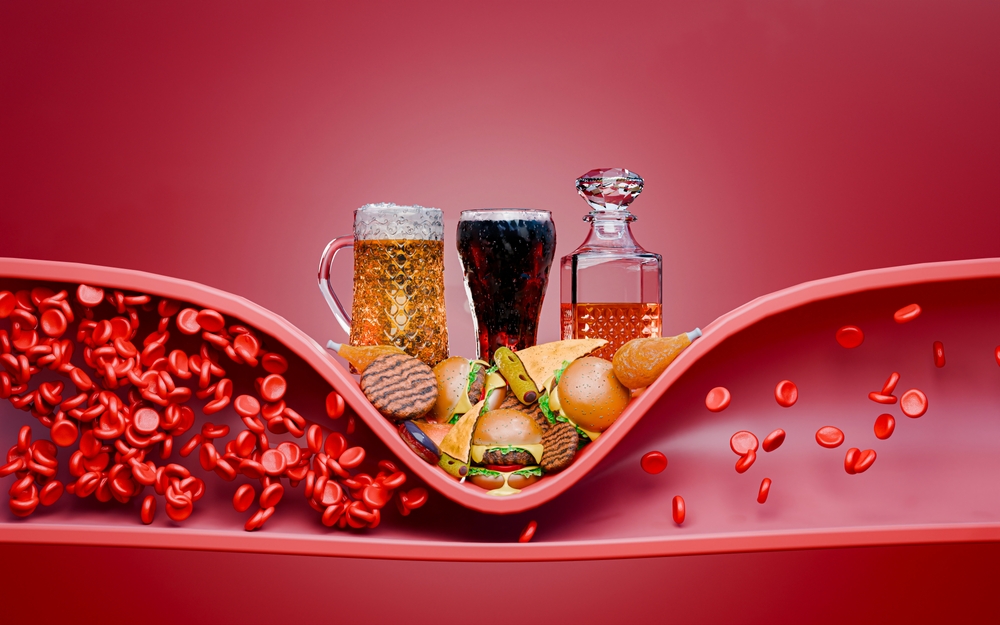
Something changes in your body when you decide to stop eating sugar. Not tomorrow. Not next week. Right now.
Most people walk around consuming 17 teaspoons of added sugar every single day. Three times what doctors recommend. Your morning coffee. Your afternoon snack. Your evening dessert. Sugar hides everywhere, and your body has learned to expect it. But what happens when you take it away?
A simulation from Untold_Healing on YouTube reveals something most people never see coming. Your body doesn’t just miss the sweetness. It revolts. It fights back. And over seven days, it transforms in ways that might shock you.
You might think cutting out sugar would be simple. Just stop buying cookies. Skip the soda. Say no to dessert. Easy, right? Wrong. Your body has other plans.
Days One and Two Feel Like Punishment
Hour 24 arrives, and your head starts pounding. Not a gentle ache. A real headache that makes you wonder if you made a terrible mistake. Your mood swings like a pendulum. One moment you feel fine. Next moment, rage bubbles up over nothing. Someone chews too loud. Someone breathes wrong. Everything irritates you.
Fatigue crashes over you like a wave. You slept eight hours, but your body feels like it ran a marathon. Getting out of bed takes effort. Walking to the kitchen feels like climbing a mountain.
Your brain has been getting regular dopamine hits every time you ate something sweet. Dopamine floods your reward center and tells you everything feels good. Now those hits stop coming. Your brain panics. It sends signals screaming for more sugar. It creates headaches. It manufactures mood swings. It drains your energy. All to make you give in.
Cravings arrive with teeth. You walk past a bakery, and the smell of fresh pastries makes you stop in your tracks. You open the pantry looking for something, anything else to eat. But what you really want sits on the top shelf. Cookies. Candy. Something sweet. Your willpower battles your biology. And biology fights dirty.
People who try to quit sugar during these first 48 hours often fail. Not because they lack discipline. Because their bodies wage war against change. Dopamine levels plummet. Blood sugar regulation goes haywire. Every cell that got used to quick energy from simple sugars now screams for more.
You might feel nauseous. Some people actually vomit. Brain chemistry shifts can trigger waves of queasiness that make eating anything difficult.
Sleep becomes a joke. You lie in bed, exhausted but wired. Your body can’t figure out how to rest without its usual sugar cycle. Tossing and turning replaces peaceful sleep. Days one and two test everything you have.
Days Three and Four Bring Clarity
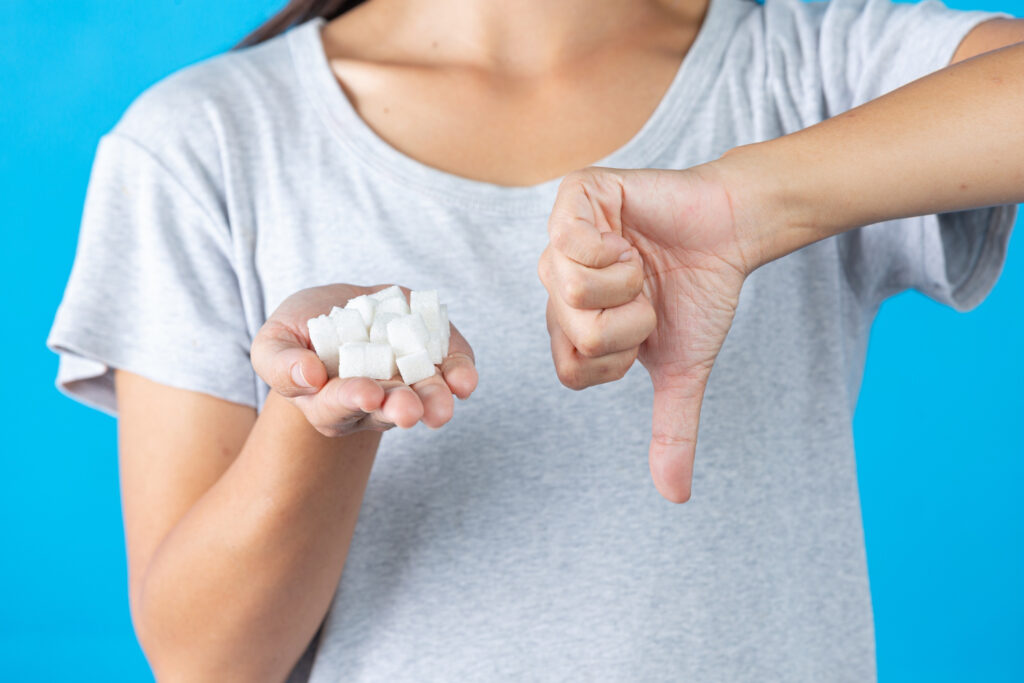
Something shifts on day three. You wake up, and your head doesn’t pound. Not completely. Maybe a dull ache lingers, but that sledgehammer feeling has faded. You stand up, and energy flows through your body. Real energy. Not the fake, jittery buzz you got from sugar highs.
Mental fog starts to lift like morning mist burning off a lake. Remember that 3 p.m. crash? When your eyelids got heavy and concentration vanished? Gone. Your energy levels out. Becomes stable. Consistent. You make it through the afternoon without needing a nap or reaching for candy.
Your mood still swings, but less wildly. Irritability backs off. You stop wanting to bite people’s heads off for minor annoyances. Your brain begins adjusting to life without constant dopamine spikes.
Cravings still whisper. You still think about sweets. But the desperation fades. Instead of needing sugar right now or else, you simply want it. Want feels different than need. Want you can ignore.
Your body starts remembering how to function on real food. Proteins. Healthy fats. Complex carbohydrates that break down slowly and provide steady fuel. Your cells adapt. Your metabolism recalibrates.
Days three and four mark the turning point. You’ve survived the worst. Your body stops fighting quite so hard. It begins accepting this new reality where sugar doesn’t rule every decision. You might even notice you feel better than you have in months.
Days Five Through Seven Show Real Change

Look in the mirror on day five. Your face looks different. Puffiness around your eyes and cheeks has decreased. Inflammation inside your body was making your face retain water and swell. Now that inflammation drops. Your skin appears less bloated. Features look sharper.
Breakouts that were forming start to fade. Sugar spikes insulin, and insulin triggers oil production in your skin. Less sugar means less insulin. Less insulin means less oil. Less oil means fewer breakouts. Your complexion begins clearing.
Redness calms down. Skin tone evens out. You look more rested even though your sleep is just starting to improve.
Because now, finally, sleep gets better. Your body has figured out how to regulate itself without sugar’s interference. Melatonin production normalizes. Your circadian rhythm finds its balance again. You fall asleep easier. You stay asleep longer. You wake up feeling actually refreshed instead of groggy.
Cravings lose their grip. Sweet foods still smell good. You still remember how much you enjoyed them. But that intense, clawing need has vanished. You can walk past a candy aisle without white-knuckling your cart. You can watch someone eat dessert without feeling tortured.
Your taste buds start changing too. Foods you never thought tasted sweet suddenly do. Carrots taste sweeter. Apples taste like candy. Your palate recalibrates to appreciate natural sugars instead of needing everything hyper-sweetened.
By day seven, you’ve made it. One week without sugar. Your body has transformed in ways you can see and feel. But why does all of this happen? Why does your body react so violently to losing something that hurts it?
Why Your Brain Fights You So Hard
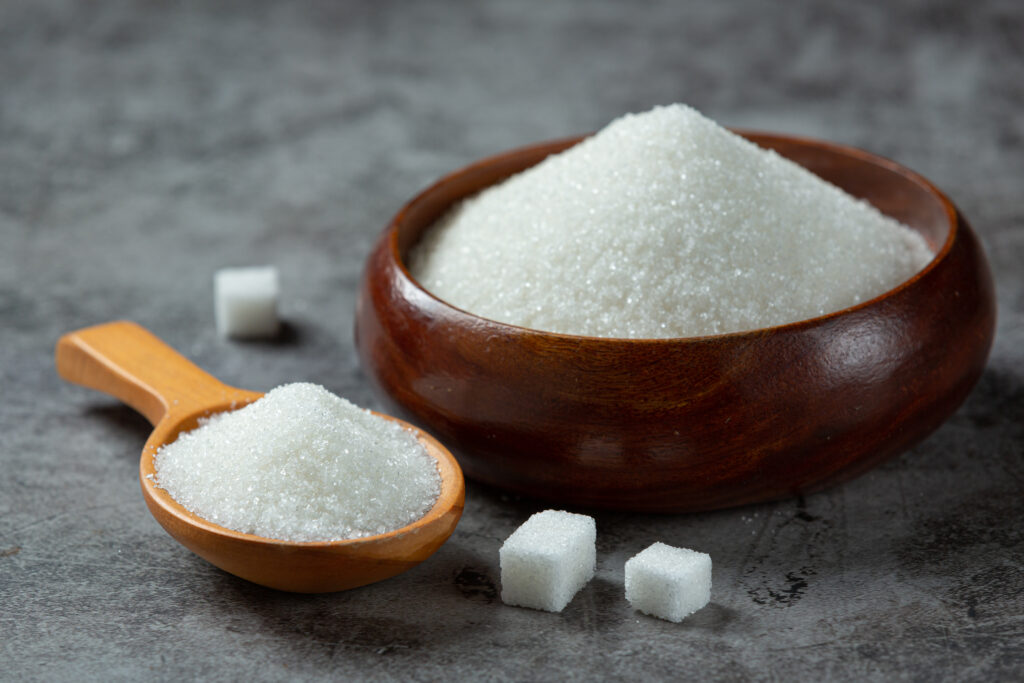
Sugar hijacks your brain’s reward system. Every time you eat something sweet, your brain releases dopamine. Dopamine is a neurotransmitter tied to pleasure and reward. It makes you feel good. It tells you to do that thing again. It creates powerful associations between sugar and happiness.
Over time, your brain gets used to these dopamine surges. It starts expecting them. Depending on them. When sugar consumption becomes regular, your brain builds neural pathways that crave those hits. Remove the sugar, and dopamine levels crash.
Your brain interprets this crash as danger. Something is wrong. Something essential is missing. It sends out distress signals. Headaches. Anxiety. Mood swings. All designed to make you fix the problem by eating sugar again.
Experts at Addiction Help explain how powerful sugar’s effect on brain chemistry can be. “Sugar consumption can have a powerful effect on the brain’s production of dopamine, a neurotransmitter associated with feelings of pleasure and reward.”
When you develop a dependence on sugar, your brain chemistry literally changes. Not metaphorically. Physically. Neurotransmitter production shifts. Reward pathways get rewired. Your brain becomes dependent on external sugar to trigger internal pleasure chemicals.
Sugar’s reward can be more potent than drugs we consider seriously addictive. Yet we put it in everything. We feed it to children. We build celebrations around it. We don’t think twice about it. Until we try to stop.
Some people struggle more than others with sugar withdrawal. Genetic factors play a role. So does your history with sugar. Someone who has consumed large amounts for years will have a harder time quitting than someone who only occasionally indulges.
Your brain has learned that sugar equals survival. It associates sweetness with energy, with pleasure, with reward. Breaking that association takes time. Your neural pathways need to reform. Your neurotransmitter production needs to rebalance. Seven days starts that process. But understanding why it’s hard makes it easier to push through.
How Long Before You Feel Human Again
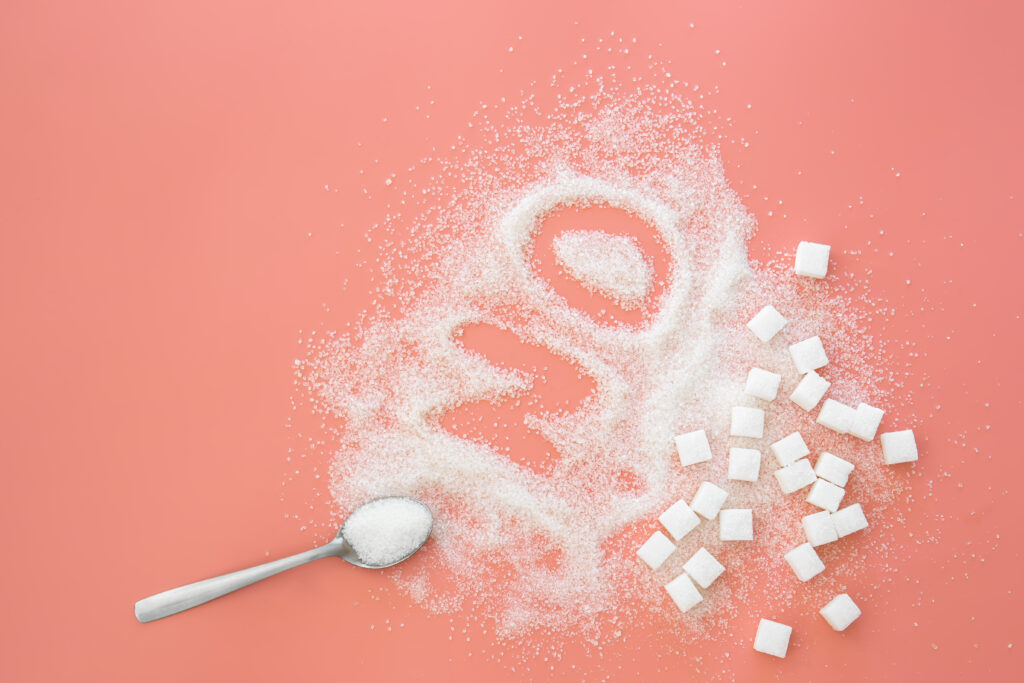
Sugar withdrawal typically lasts a few days to a few weeks. Everyone’s timeline differs based on how much sugar they consumed and for how long.
Early stage symptoms hit hardest in days one through four. Headaches peak. Cravings scream. Mood swings rage. Your body fights change with everything it has.
Later stage symptoms from days five through fourteen involve lingering fatigue and occasional cravings. Brain fog lifts. Sleep improves. Energy stabilizes. But you still think about sugar sometimes. You still feel tempted.
Going cold turkey versus gradual reduction changes your experience. Cutting all sugar at once triggers intense withdrawal symptoms. They hit harder but end faster. Gradually reducing sugar intake spreads symptoms over more time. They’re milder but last longer.
Neither method is inherently better. Choose based on your life circumstances and personality. Some people need clean breaks. Others do better with gentle transitions.
Risk of relapse and withdrawal cycling can trap you. Some people quit sugar, suffer through withdrawal, then crack and eat sweets again. They feel guilty. They try quitting again. They withdraw again. They relapse again.
Each cycle makes the next harder. Your brain learns the pattern. It knows you’ll probably give in eventually. Your willpower weakens with each failed attempt. Pick your method and commit. Waffling only prolongs suffering.
Why Seven Days Matter More Than You Think
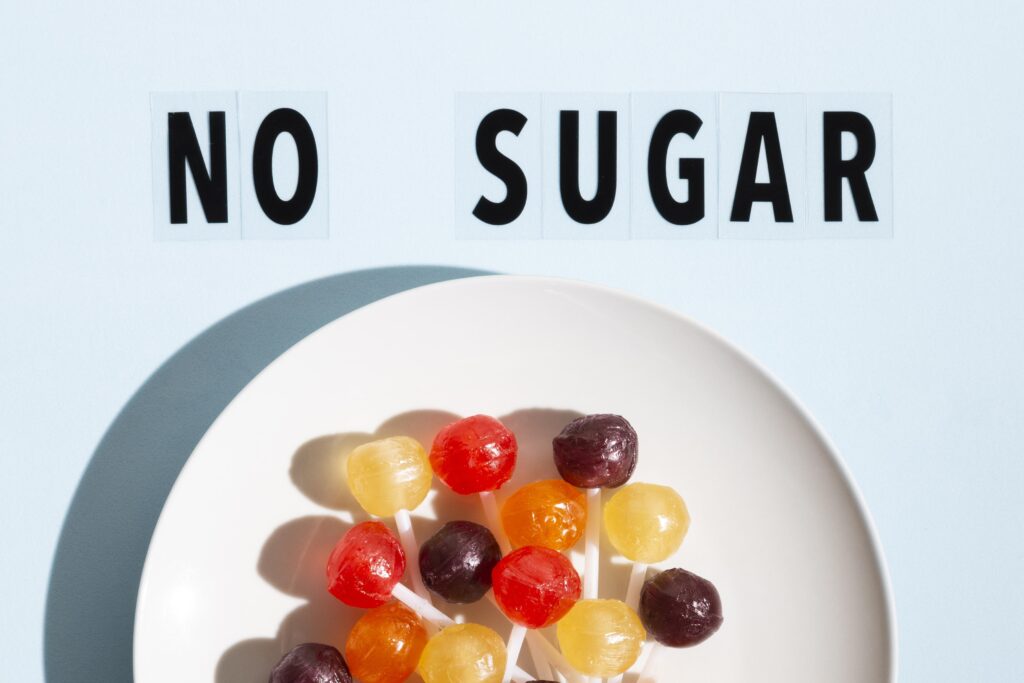
Seven days proves something to yourself. You can change. You can resist. You have more strength than you realized.
But seven days also starts preventing serious health problems. Excessive sugar consumption links directly to type 2 diabetes. Your body stops processing insulin correctly. Blood sugar stays elevated. Your pancreas exhausts itself trying to compensate.
Obesity follows chronic sugar overconsumption. Sugar converts to fat when your body doesn’t need immediate energy. Extra weight accumulates. Health problems multiply.
Heart disease risk increases with sugar intake. Inflammation damages blood vessels. Blood pressure rises. Your cardiovascular system suffers.
Cutting sugar reduces all these risks. Seven days begins reversing damage. Your body starts healing.
Your Next Seven Days Start Now
You’ve read about the headaches. You know about the mood swings. You understand why your body will fight you. You also know what waits on the other side. Clearer skin. Better sleep. Stable energy. Freedom from cravings that control your every decision. Seven days. 168 hours. One week of your life.
What if you tried? What if you committed? What if you discovered you’re stronger than your sugar addiction? You don’t need to be perfect. You don’t need to never eat sugar again for the rest of your life. You just need to see what seven days without it feels like.
Start tomorrow morning. Or better yet, start with your next meal. Clear the candy from your desk. Pass on dessert tonight. Choose water instead of soda. Your body will protest. Remember that protest means change is happening. Remember that discomfort is temporary. Remember that you’re rewiring your brain and healing your body.
When cravings hit, drink cold water. When your head pounds, rest. When irritability surges, remind yourself this will pass.
Seven days from now, you’ll look back at this moment. You’ll remember deciding to try. You’ll feel proud of what you accomplished. Your health matters. Your wellbeing matters. You matter more than any dessert or sugary drink. Choose yourself. Choose change. Choose seven days to transform. Start now.
Loading...

